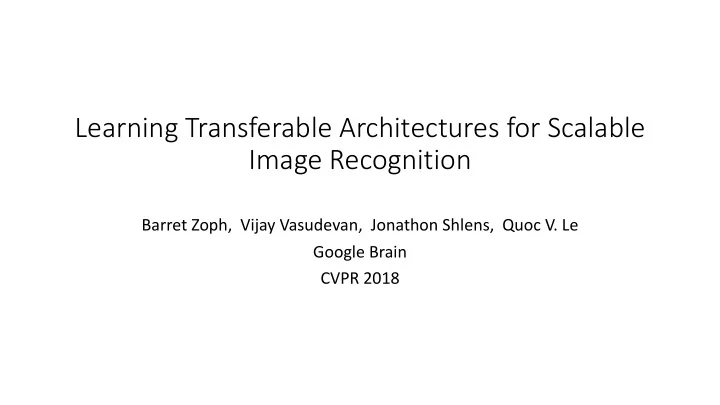

Learning Transferable Architectures for Scalable Image Recognition Barret Zoph, Vijay Vasudevan, Jonathon Shlens, Quoc V. Le Google Brain CVPR 2018
Motivation GoogLeNet (2014): ImageNet Top-5 accuracy 93% • CNN models require significant architecture engineering • Can we design an algorithm to design the model architecture?
Previous Work • Hyper-parameter Optimization • Included in NASNet • Transfer Learned Architecture • Notably worse than other SOTA methods • Meta-learning • Not applicable to large scale dataset (e.g. ImageNet)
Previous Work (N (NAS) • Neural Architecture Search with Reinforcement Learning [Barret & Quoc 2017] Controller RNN
• NAS (2017) Limitations: • Computationally expensive for only small datasets (e.g. CIFAR-10) • No transferability between datasets • NASNet (2018) : Re-designing the search space • Computation cost is reduced • Transferable from small dataset to large dataset
NASNet: Convolution Cells • The overall architectures are manually predetermined • Composed by two repetitive Convolution Cells : • Normal Cell: • Output same-dimension feature map • Reduction Cell: • Hight & Width of the output are halved • More reduction cells on ImageNet Architecture
NASNet: Controller • Predictions for each cell are grouped into B blocks Each block has 5 prediction steps • • In step 5, the combination can be addition or concatenation Operation list for step 3, 4
NASNet: Controller • Controllers have 2 ✕ 5 B predictions • Trained by same reinforcement learning proposal as NAS • Random search is applicable, but worse than RL
• Advantages: • Scalable to the different image datasets • Strong transferability in experiments. • Disadvantages: • Training cost expensive: 500 GPUs over 4 days • Fixed layers
Results: CIFAR-10 Architecture of the best convolutional cells
Results: Transfer to ImageNet
Results: Transfer to ImageNet
Results: Object detection
Conclusion & Discussion: • Contribution: a novel search space for Neural Architecture Search • Neural Architecture Search may improve the human-designed models • Can we use similar method to construct an autoencoder? • Is it possible to further reduce the training cost and computation cost?
Reference • Neural Architecture Search with Reinforcement Learning • [Barret & Quoc 2017] • Learning Transferable Architectures for Scalable Image Recognition • [Barret et al. 2018]
Recommend
More recommend